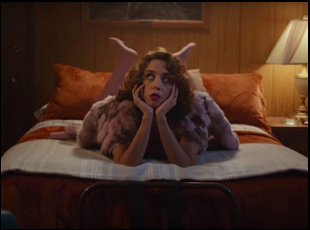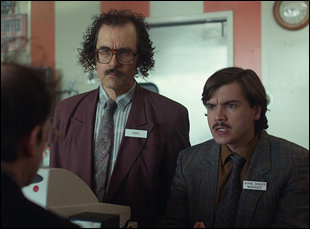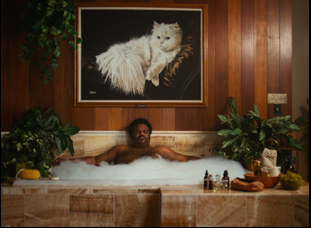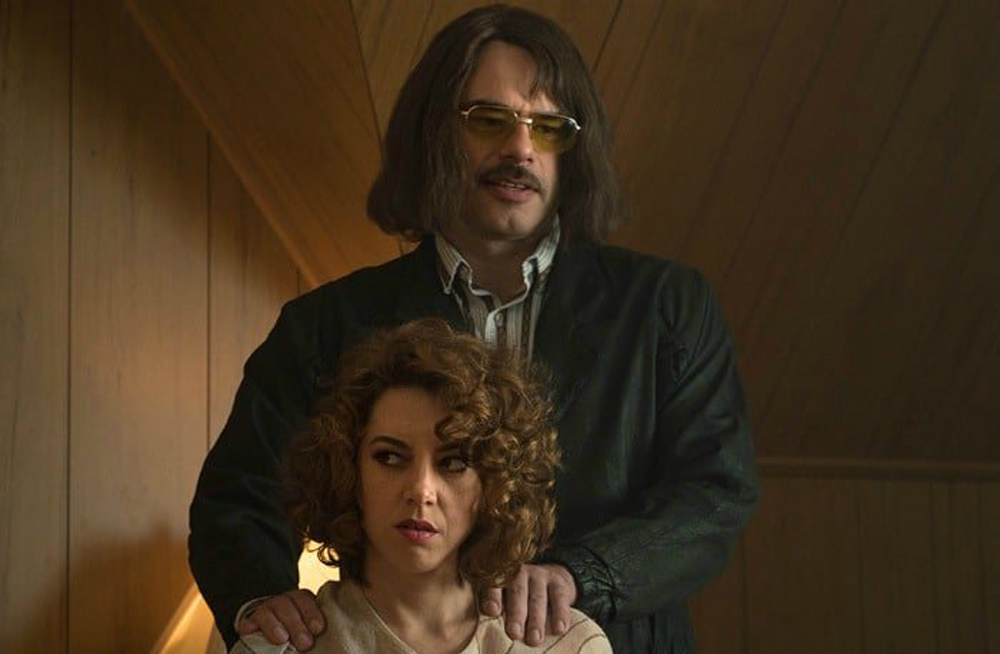“Anything with a strong personality is just going to divide opinion. That’s just how it is,” Jim Hosking tells me, after I describe a fight I had in line with a fellow patron at Sundance following a screening of his latest film “An Evening with Beverly Luff Linn.” “It’s like if you go to a dinner party and sit next to somebody who’s got quite a powerful point of view, you can either get off on that or you can wish you were sitting next to somebody else.”
Hosking isn’t defensive when he says this, though I was after being pleasantly surprised by the comedy starring Jemaine Clement and Aubrey Plaza as an odd couple who make sense in each other’s company as the latter finds herself on the run as Lulu Danger, the wife of a diner manager Shane Danger (Emile Hirsch) who recently stole some money from her brother, and feeling stuck in an unhappy marriage, she decides to head for the hills herself with the ill-gotten gain to the remote Moorehouse Hotel where she can blend into the crowd assembled for the titular concert. However, there are only a few oddballs at the place, including Luff Linn (Craig Robinson), who only communicates in grunts to save his voice for his performance, complicating Lulu’s efforts to evade her husband or his goons, and she is forced to enlist the services of Clement’s daft but lovesick Colin Keith Threadener, who was initially hired to help her brother, for cover.
An audacious farce commences, but unlike Hosking’s previous film “The Greasy Strangler,” there’s a sweetness to accompany the squirm-induced laughs as Lulu and Colin’s quite literal escape from danger becomes a celebration of the eccentricities that define us and accepting them in others, though still, the director is hardly making a film for everyone’s tastes, which one can tell simply from the bizarro cocktails mixed at the Morehouse Hotel bar that fuels no small part of the film’s anarchy. Yet for those who do enjoy something off the menu, “An Evening with Beverly Luff Linn” is quite refreshing, engaging a strong cast that also includes Matt Berry, Jacob Wysocki and Maria Bamford in wild antics that unfold in Hosking’s carefully constructed comedy, where planning far better than Lulu’s schemes in the film’s elegant yet idiosyncratic production design and score lend credence to a world where the madness inside can subsist, drawing you in rather than pushing you away. Recently in Los Angeles on the eve of the film’s theatrical run, the writer/director spoke about why he actually likes to leave room for surprise, including his reasoning to do something a little more heartfelt with his latest and casting actors to get something out of them that he hasn’t seen before rather than because of what he has already.

I saw it as the most challenging thing I could do and it was a much more challenging film for me than “The Greasy Strangler.” It came very naturally for me from “Strangler” because my remit [there] to myself was to really push character and to push dialogue and to just be quite alright about letting everything go as far as it wanted to go, but then with “Luff Linn,” I was trying to combine a slightly absurd or peculiar world, that was definitely comedic, [with] sincerity in caring about these characters. I wanted to make a love story in a way and to surprise viewers so they might get to the end of the film and feel quite moved after watching it, but not expecting that to happen. People would think “The Greasy Strangler” was the real punk rock statement, if you wanted to say something cheesy, but in a funny way, “Luff Linn” is more punk rock for me to do, trying to connect with people. But I’m not trying to be punk rock, either, if you could make that clear. Punk rock is 40 years old.
If I remember correctly, this all came about from a single scene with Shane Danger, of all characters, you were sent by your co-writer David Wike. What was so striking about it that you thought there was a film there?
David’s writing makes me laugh and I like hanging out with him, so I read the scene and I could tell we could go anywhere with this story. And I liked the fact that neither of us knew where it was going and it was going to be fun writing it. That’s the way that I like to work. I don’t sit down and think, “Oh, I need to make a film.” No one needs me to make a film. It’s more oh, this thing has appeared, am I interested in it? I really like the fact that I have no idea where it’s going to go or even why I’m compelled to do it because as soon as I can’t quite work it out or have full knowledge, I know it will go to places that will surprise me. Really, I’m trying to surprise myself as much as I’m trying to surprise anybody else and to make work that feels liberating and quite cathartic. It feels like everybody needs a bit of a laugh these days as well.

I definitely had an image of something in my head, but originally, it was probably more like a Scottish castle or something more like a faux British historic building, but my production designer found the location online, so we ended up shooting in Eureka in Northern California because of that hotel. I wanted something that felt as much as a wonky character as the characters in the film.
The score is also quite eclectic, ranging from Tangerine Dream-esque soundscaping to nimble strings. How did you work with your composer?
Andrew Hung had done the music for “Greasy Strangler,” and that had an antagonistic, nagging soundtrack, so I wanted to do something very different with this. My original idea was to simply have solo piano and it was going to be a very plaintive, introspective, meditative score, and I thought it would be a really interesting challenge for me to do something so different, but as I was cutting the film, I wanted certain scenes to have maybe more self-confidence or even arrogance — I wanted the music to become more imposing, so gradually we started adding other pieces. Or we might take some of the piano pieces and add to those as well, so a sound gradually evolves. The first music cue in the film when the picture starts, there’s a very striking synthesizer sound that almost sounds like trumpets and that suddenly became a sound [we’d refer back to] in the film.

I don’t mind us going off somewhere if it feels like it comes from the right place, if it feels like the character would do, but I write very specific dialogue and I dress the characters very specifically and I style them, whether it’s their hair or some of them might wear wigs or whatever. So I do care about sticking to the road in a way, but also you don’t really know how anything is going to work until you start filming and even when you rehearse, it’s only when you have the characters there in their costumes and in that location that you feel how it’s working and then I’m very open to getting rid of certain lines or adding other lines or being spontaneous about how a scene might play out. That’s the fun part of working with people. I like walking that tightrope where you just have no idea how it’s going to pan out.
I don’t storyboard things rigorously and have very fixed ideas about how all the scenes should be – maybe some of them I do more than others, but there’s a lot in “Luff Linn” where we created new moments and new dialogue and I want [the actors] to bring their special talents to the set, but I want them to inhabit these roles and create performances that are surprising. So I’m thrilled for example that I think I got something really special from Aubrey Plaza and from Jemaine Clement [because] I feel like I haven’t really seen any of them be quite like this in any other work that they’ve done.
Did Craig Robinson come to you with how his voice would sound right off the bat? How’d you figure that out?
His character’s dialogue was “Hmmm…” so we would’ve talked about it pretty quickly the first time that we spoke on the phone and when I went to the fitting, we would’ve laughed about it because it’s funny that he’s a very adept, skilled actor and yet he was being completely confined and hamstrung by this tiny bit of vocabulary. But in a funny way, that’s quite a freeing tool because it’s an interesting challenge to be able to express yourself in many ways, but in such a limited fashion. And all of the actors wanted to try something different. You don’t make loads of money making these films. I’d only made one film previously that I think lots of people thought was just very weird, so if they were prepared to get onboard “Luff Linn,” it’s because they wanted to do something different.
“An Evening with Beverly Luff Linn” opens on October 19th in Los Angeles at the NoHo 7 and New York at the Village East and on demand and digital.




